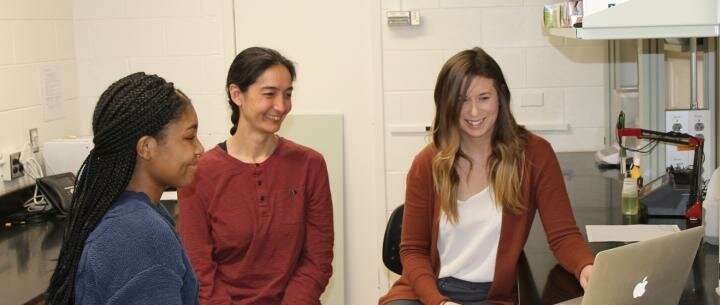Research reveals measles vaccine efficacy

The recent measles outbreaks across the country emphasize the importance of vaccinations.
"For many infectious diseases, we rely on herd immunity to prevent outbreaks of vaccine-preventable infections. Herd immunity is the protection of the 'herd,' our population, by preventing infections in the vast majority people," said Kate Langwig, an infectious disease ecologist at Virginia Tech. "We can calculate the percentage of the population that needs to be vaccinated to prevent diseases from spreading and maintain herd immunity. For some pathogens, like measles, the number that needs to vaccinated is very high because the measles virus spreads so easily."
Langwig, an assistant professor in the Department of Biological Sciences in the College of Science at Virginia Tech, is researching ways in which vaccine efficacy can be improved.
The measles vaccine has been shown to have 97 percent efficacy, but "understanding the circumstances that contribute to vaccine ineffectiveness can help to better protect populations," Langwig said.
Langwig and her lab ran mathematical modeling simulations to determine if vaccine efficacy might be lower when individuals are exposed to high pathogen doses, and when individuals vary in their susceptibility.
For example, if you have been vaccinated against the measles, but someone sneezes very close to your face, or you're caring for a sick kid who is sneezing, coughing, etc., are you more likely to get sick? In addition, if you're run down (maybe from chasing that kid the week earlier), are you more likely to get infected even if you've been vaccinated?
Langwig and her lab found in their simulations that vaccines are predicted to be less effective at higher pathogen doses and when individuals in the population have similar susceptibility. These findings were recently published in Scientific Reports.
"Susceptibility, meaning how likely an individual is to get infected, is also important. Individuals that are younger or have poor nutrition can be more likely to get infected, even if they have been vaccinated. We found that populations that have more variable susceptibility have higher vaccine efficacy," said Langwig, an affiliated faculty member of the Global Change Center, an arm of the Fralin Life Science Institute.
Langwig and her lab were interested in validating their simulations with some real-world data, so they did a systematic literature review with help from Virginia Tech undergraduate researchers to determine whether there were examples of diseases where vaccines efficacy is reduced at high doses.
"What we found was a bit of a shock—there are a very small number of studies that test whether vaccines are effective across multiple pathogen doses. We reviewed almost 6,000 articles and identified only about a dozen studies that had tested vaccines across multiple pathogen doses. Within those few studies, the pattern was generally consistent with our simulation—vaccine efficacy tended to be lower at high pathogen doses," said Langwig.
They did find that some vaccines did offer complete protection regardless of pathogen dose in several model organisms, suggesting that not all vaccines are less effective when individuals are exposed to high doses.
Extrapolation to human systems should be done with care, but this research helps increase the understanding of host susceptibility, pathogen dose, and vaccine efficacy.
"One thing that surprised us is that many scientists are vaguely aware that vaccines might fail at high pathogen doses, but there were a very small number of studies that had ever examined this," said Langwig.
Langwig is currently collaborating with another lab to test vaccine efficacy and different pathogen doses in a species of rainbow trout. They will continue to design mathematical models to test predictions in real-world situations to determine how populations can be further protected.
More information: Kate E. Langwig et al, Limited available evidence supports theoretical predictions of reduced vaccine efficacy at higher exposure dose, Scientific Reports (2019). DOI: 10.1038/s41598-019-39698-x



















